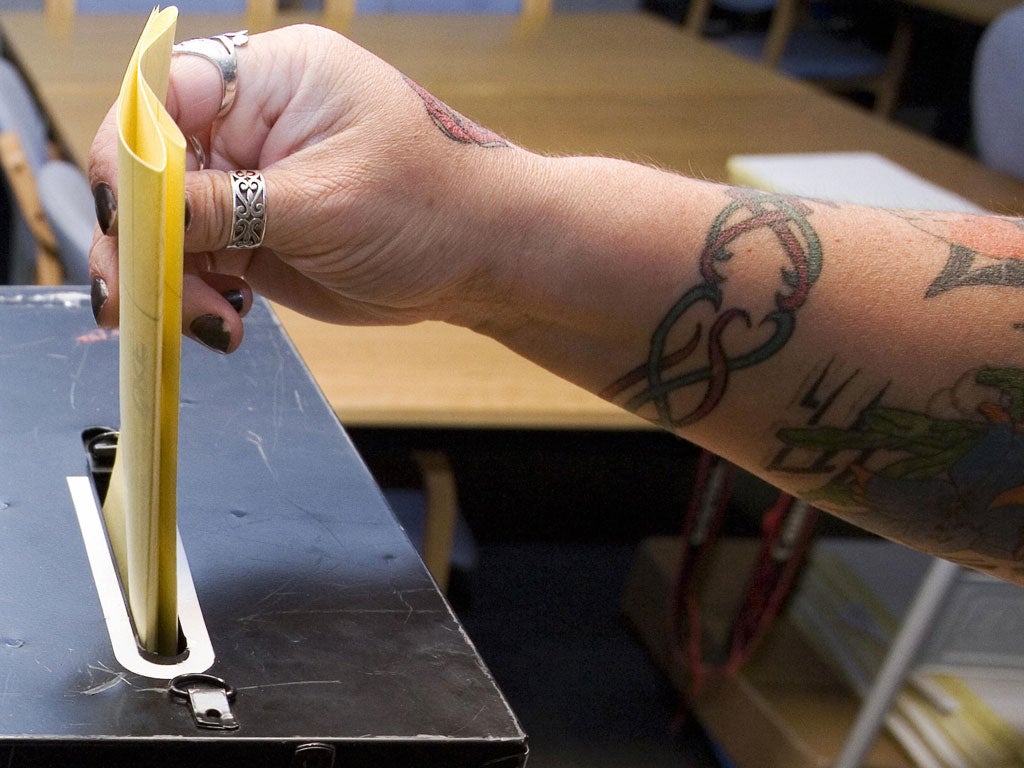David Cameron's police reform fails to impress
This week's turnout for elected commissioners could be the lowest ever

Your support helps us to tell the story
From reproductive rights to climate change to Big Tech, The Independent is on the ground when the story is developing. Whether it's investigating the financials of Elon Musk's pro-Trump PAC or producing our latest documentary, 'The A Word', which shines a light on the American women fighting for reproductive rights, we know how important it is to parse out the facts from the messaging.
At such a critical moment in US history, we need reporters on the ground. Your donation allows us to keep sending journalists to speak to both sides of the story.
The Independent is trusted by Americans across the entire political spectrum. And unlike many other quality news outlets, we choose not to lock Americans out of our reporting and analysis with paywalls. We believe quality journalism should be available to everyone, paid for by those who can afford it.
Your support makes all the difference.Barely one in six people will bother to vote when Britain elects its first police and crime commissioners this week, ministers have been warned.
The latest assessment of voting intentions presented to the Home Office has laid bare concerns that David Cameron's flagship policy of having elected police supremos for every area of England and Wales has failed to catch the public's imagination. Despite the Government's desperate attempts to drum up enthusiasm for the 41 new commissioners, almost 85 per cent of eligible electors are expected to stay at home instead of casting their votes on Thursday, Home Office sources confirmed last night.
The grim official prognosis is even lower than the pessimistic 18.5 per cent turnout predicted by the Electoral Reform Society last month, when the pressure group warned that the attempt to establish the commissioner system had descended into "farce". The previous lowest turnout recorded for a nationwide election was the 28 per cent recorded in the English local elections in 1998.
The apparent indifference is the latest blow to hit a policy that the Prime Minister unveiled in his 2010 manifesto as a way of "giving people democratic control over policing priorities". The early stages of the process were marked by the disqualification of a number of respected candidates – including the Falklands War veteran Simon Weston – because they had committed minor offences decades earlier. Amid growing complaints about an overall bill conservatively estimated at £75m, the Government was forced to shred thousands of ballot papers in Wales and produce new ones – at an extra cost of £350,000 – because they were not printed in English and Welsh.
In the midst of furious opposition from political rivals and the police, ministers have been condemned for not publicly backing their brainchild and failing to ensure enough people are even aware the election is happening. The decision to hold the poll on a winter's day in mid-November has become an emblem of their alleged failure to give the new system any chance of a successful start.
"Voters have failed to get a clear message from the Government that these are elections that matter," said John Curtice, professor of politics at Strathclyde University. "These posts do matter because they will be people who hire and fire those in charge of policing, but we must have considerable fears indeed that the turnout is going to be very low."
The result is that, while policing minister Damian Green maintains that "the introduction of PCCs is the most significant democratic reform of policing ever", the actual contests in many of the 41 force areas have an old-school look about them, with the candidate lists dominated by local councillors and, significantly, former MPs and ministers.
The list of ex-Labour ministers is impressive, headed by Lord Prescott, in Humberside. Labour is also putting up six more former ministers – Tony Lloyd, Alun Michael, Jane Kennedy, Vera Baird, James Plaskitt and Paddy Tipping – and former Labour MEP Simon Murphy.
The Conservatives have complained that the mass assault is a cynical move to increase the earning power of politicians on the downslope of their careers. But it is also a calculated move by Labour to benefit from a policy they did not support in the first place – or at least to prevent the Conservatives seizing control of policing across the country.
But the Conservatives' own candidate list is not entirely composed of political clean-skins. Among the local councillors are two former Tory MPs – Sir Graham Bright and Michael Mates. Two more, Rod Richards and Walter Sweeney, are standing as independents.
Labour remains confident of returning more than a dozen commissioners in heartland areas across the North and in Wales. "The rest of the country is difficult to judge," a senior party official said last night. "It is clear that the Tories will struggle to get the levels of support they got in 2010, and the Lib Dems aren't even contesting all seats, so we should pick up some areas."
Mr Green maintains that a low turnout will not undermine the Government's centrepiece police reform: "Electing people who are responsible to the public, who can shine a light on the individual police forces, seems to me a significant step forward, not just for democracy, but actually for improving the way we do policing in this country.
"I'm fascinated that people seem not to want democracy. If you don't vote you can't complain afterwards."
Join our commenting forum
Join thought-provoking conversations, follow other Independent readers and see their replies
Comments